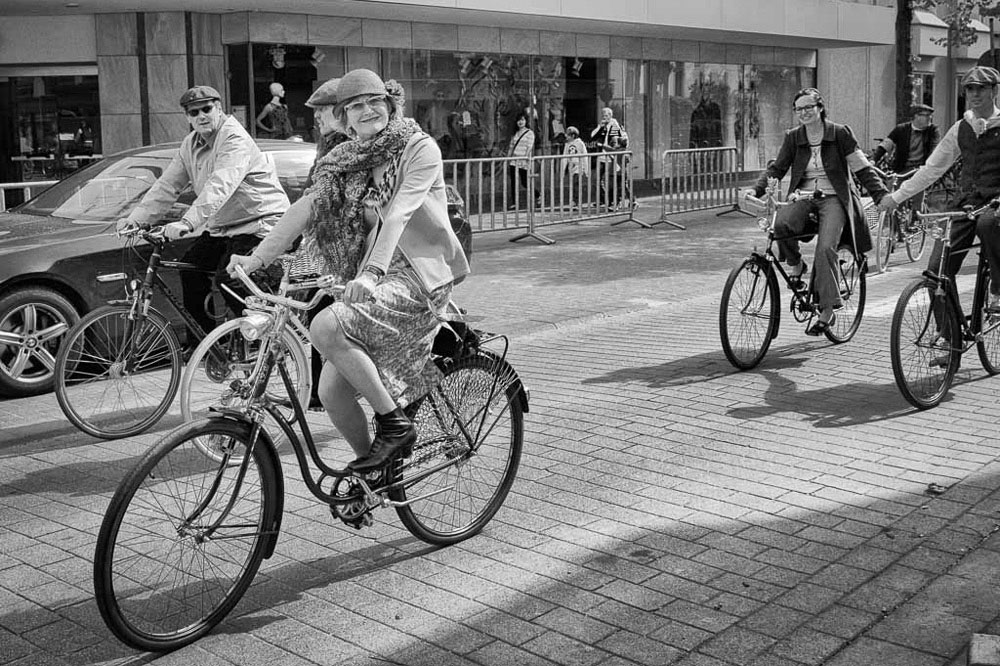Autumn Gear Guide
Find inspiration in our Gear Guide that will keep you out on your bike through wind or rain.
Download NowAs more cities and companies realize bicycling reduces health care expenses, they are beginning to think cycling is good for business.

Image courtesy of Foto-Michel
This story was originally published on Urbanful on December 1, 2014.
Bicycling, especially bicycle commuting, is better for your health, your wallet and your employer. Here are a look at the ways cities and companies in the U.S. and abroad are re-evaluating their investments in bicycle infrastructure and bicycle commuting incentives.
Bike More, It’s Good for You
Studies continue to show that cycling, whether for leisure or commuting, has measurable health benefits, from better cardiovascular health to improved mental health and weight loss.
A 14-year study of some 30,000 people between the ages of 20 and 93 in Copenhagen, for instance, found that physical activity from both leisure and commuting had benefits. Notably, “cycling to work decreased risk of mortality in approximately 40 percent” of participants and that’s after adjusting for any exercise during leisure time.
The benefits exist not just for those who ride their bikes, but also for those who use bike sharing systems. A study of London bicycle share users found the benefits of bike sharing substantially outweighed potential harms, such as exposure of air pollution from motorized and potential injury from accidents.
Health Savings of Biking
Employees who bike to work save their employers money on health care expenses. Employers that invest money to incentivize biking to work can yield significant returns on their investment.
A 2011 study published in the Journal of Physical Activity and Health examined the costs and benefits of bicycle investments in Portland, the first-ever cost-benefit analysis for an urban bicycling network in the U.S. The Portland study found that when considering the benefits of health care and fuel savings, the benefit-cost ratios for the city’s investments are between 3.8 and 1.2 to 1. Health care costs savings alone could range between $388 and $594 million by 2040; fuel savings could reach $218 million.
Based on that data, just 30 minutes of cycling each day could result in a reduction of $544 a year in individual health care costs.
And it’s not just health cost savings going into the pockets of the bicycle commuters. Companies stand to gain, too, especially in the U.S., where employers share the burden of the expense for health care with employees and the government.
Take the work by Quality Bicycle Products (QBP), a wholesale distributor of bicycles and parts to the cycling industry in Bloomington, Minnesota. It started a bicycle commuting program to encourage employees to bike to work.
QBP’s program included traditional bicycle commuter necessities like showers, locker rooms and secure bicycle storage, but it also provided perks like free breakfast on the monthly bike to work day, a $110 credit for QBP products, a bike repair shop on site and more.
Over a three-year period, QBP experienced an overall decrease of 4.4 percent in the company’s per member per month (pmpm) health care costs. During that same period the average national corporate pmpm costs increased 24.6 percent.
While the bicycle commuting program was not the only reason for the savings—QBP’s own cost-benefit study also cited other positive influences like an increased use of generics, healthier eating patterns, increased physical activity, less tobacco use , among others—the impact of biking could not be overlooked.
QBP invests approximately $45,000 per year in commuting rewards and reaps an estimated savings of $200,000 per year for bicycle commuters when compared to non-bike commuters.
That’s a lot of money that could be used for other things. Say, better facilities, new partnerships or, dare we suggest, small bonuses?
It’s one of the reasons it may be time to take bicycling more seriously, opined QBP’s Advocacy, Community Service and Environment program Director Seth Nesselhuf in a blog posts for the League of American Bicyclists.
“No longer is [the bicycle] merely a toy for kids, but one of the most powerful tools to achieve a healthier and more sustainable country,” Nesselhuf said.
Get riding.
Urbanful is a digital magazine and marketplace celebrating city living. From hacking your commute to bringing you the latest city trends, we’re all about those things that make city living great. Read more at Urbanful.org.
Find inspiration in our Gear Guide that will keep you out on your bike through wind or rain.
Download Now
Leave a comment